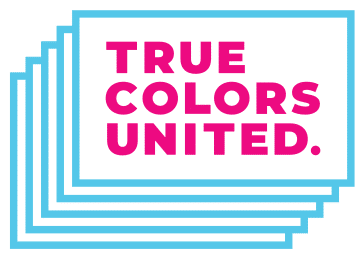PRESS RELEASE – FOR IMMEDIATE RELEASE
July 11, 2012
Contact:
Laura Rodriguez, lrodriguez@rabengroup.com, (310) 956-2425
Manny Rivera, mrivera@griffinschein.com, 323-892-2080
Gary Gates, Williams Distinguished Scholar, gates@law.ucla.edu, (202) 257-6400
Laura E. Durso, Williams Institute Public Policy Fellow, durso@law.ucla.edu
94% OF HOMELESS YOUTH SERVICE PROVIDERS REPORT SERVING LGBT YOUTH
Providers report that 40% of clients are LGBT youth
LOS ANGELES – A comprehensive report was released today on lesbian, gay, bisexual and transgender (LGBT) youth homelessness by The Palette Fund, True Colors Fund, and the Williams Institute showing that nearly all homeless youth service providers serve LGBT youth. The data comes from the LGBT Homeless Youth Provider Survey, a web-based survey conducted from October 2011 through March 2012, and the study was completed as a collaboration among the three organizations.
Based on data from 381 respondents, representing 354 agencies providing youth with homeless-related services, the report outlines key statistics on what LGBT youth populations are served by these agencies, who is most at risk, and why these populations are most at risk. Requests to participate in the web-based survey were sent to all providers on the National Runaway Switchboard and CenterLink: The Community of LGBT Centers resource lists, as well as partner agencies of the True Colors Fund.
Among the key findings, 94% of respondents from agencies reported working with LGBT youth, with providers indicating that 30% of their clients identified as gay or lesbian, 9% identified as bisexual, and 1% as transgender (for a total LGBT population served of 40%). Additionally, more than 75% of responding agencies worked with transgender youth in the past year. Survey findings suggest that 30% of clients in housing programs targeting youth are LGBT.
A majority of LGBT youth are receiving services that are available to all young people, with 24% of agency youth-oriented programs specifically being designed for LGBT youth. This underscores the need to ensure that all services are open and welcoming to the disproportionate rate of LGBT homeless youth in need of support.
Laura E. Durso, Williams Institute Public Policy Fellow and study co-author, states, “The findings from this survey demonstrate that many LGBT youth are at high risk of homelessness, often as a result of family rejection and abuse. The analyses offer critical insights into the challenges that these young people face when they seek help during a very difficult time in their lives.”
Nearly seven in ten (68%) respondents indicated that family rejection was a major factor contributing to LGBT youth homelessness, making it the most cited factor. More than half (54%) of respondents indicated that abuse in their family was another important factor contributing to LGBT homelessness.
“The results of this survey act as further confirmation that America’s next generation of gay and transgender youth need us to stand with them so that they can stand on their own.” said Gregory Lewis, executive director of Cyndi Lauper’s True Colors Fund and its recently launched Forty to None Project, which seeks to empower LGBT homeless youth and raise awareness of the issues they face. “One of our key findings shows that in order for that to happen we all need to join together and support the hard working and dedicated service providers helping these young people every day, we need to re-double our efforts to support them so they can help all of the youth in need.”
Over the past ten years, the percentage of homeless youth providers serving LGBT clients has increased from 82% to 94%. Responding agencies noted that a lack of sufficient funding, was a serious barrier in service provision. Five of the top six barriers to improving services targeting LGBT homelessness relate to a lack of funding from all forms of government, foundations and the public.
Gary Gates, Williams Distinguished Scholar and study co-author adds, “While we would all like to see an end to homelessness among all youth, it is encouraging to see how many providers are not only willing to serve LGBT youth, but recognize the unique challenges that they face. Finding additional resources to address those challenges will be critical to solving these difficult problems.”
“It is clear that these vital services need more attention and funding from both the public and private sectors and the time is now to start taking a stand in support of our youth,” said Terrence Meck, executive director of The Palette Fund. “I truly hope that Palette’s involvement will encourage other foundations and individuals to get involved in this important cause so we can start making a difference in these young peoples’ lives and help bring that 40% closer to zero.”
For more information about the study, visit:
###
About The Palette Fund
The Palette Fund honors the legacy of Rand Harlan Skolnick through collaborative grantmaking and programs that value human rights and education. The Foundation focuses on Nutrition & Wellness, Patient Navigation, and Queer Youth. Rand committed his heart and soul to his philanthropic work throughout his life, and The Palette Fund seeks to continue and grow his pioneering vision. For more information, go to: www.ThePaletteFund.org
About the True Colors Fund
The True Colors Fund was co-founded by Cyndi Lauper to inspire and engage everyone, especially straight people, to become active participants in the advancement of equality for all and, through its Forty to None Project, raise awareness about and help bring an end to gay, lesbian, bisexual and transgender youth homelessness. For more information, go to: www.TrueColorsFund.org
About the Williams Institute
The Williams Institute on Sexual Orientation and Gender Identity Law and Public Policy advances law and public policy through rigorous, independent research and scholarship, and disseminates its work through a variety of education programs and media to judges, legislators, lawyers, other policy makers, and the public. A national think tank at UCLA Law, the Williams Institute produces high quality research with real-world relevance. For more information, go to: http://williamsinstitute.law.ucla.edu/
